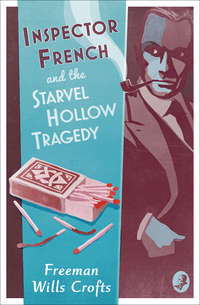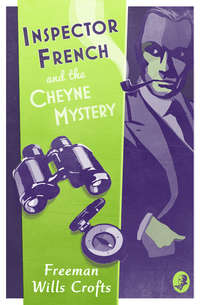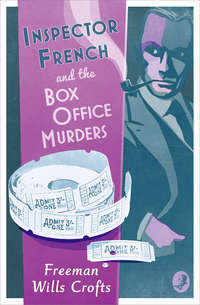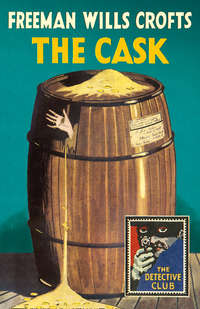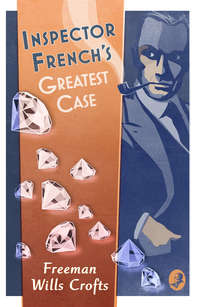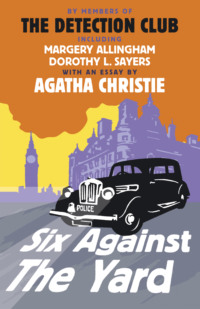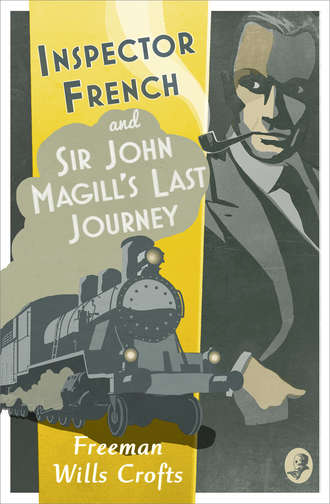
Полная версия
Inspector French: Sir John Magill’s Last Journey
‘Was the man in Bangor expecting Sir John?’
‘No, sir. He was absolutely surprised at the whole thing. He had no business with Sir John and hardly knew him.’
‘I suppose your people checked up Major Magill’s statement?’
‘At once, sir. We started men at Larne Harbour to trace the old man’s movements. They found two stewards on the boat, both of whom had been on that service for years. Both had known Sir John when he was living in Belfast and both recognised him again. He had booked a private cabin and went straight to it when he got aboard at Stranraer and stayed there all the time. He didn’t have anything to eat though it was a calm morning and he was quite well. When they were coming into Larne one of the stewards went to call him and found him asleep.
‘He’d gone ashore at Larne Harbour and spoken to the stationmaster about his luggage. “I want this stuff sent to my son’s, Major Malcolm Magill’s,” he had said. “I’m going on to Belfast and I’ll be down again in the evening.” He asked the cost and paid. The stationmaster saw him into the Belfast train.
‘Our men then saw the guard of the train, who happened to be at the harbour. He remembered seeing the man in question talking to the stationmaster and the stationmaster seeing him into the train. Before the train started he collected the tickets and he noticed Sir John alone in a first-class compartment. He noticed him again on the platform at Belfast. He was carrying a medium-sized despatch case.’
Chief-Inspector Mitchell reached forward and carefully removed the ash from his cigar.
‘Bit of luck getting all that evidence surely?’ he remarked, while French nodded emphatically.
‘It was, sir, and yet not so much as you might think. There aren’t many cross by that morning service at that time of year and Sir John was striking-looking enough to have been noticed.’
‘Lucky for you, Sergeant, all the same. Well, you’ve got him to Belfast.’
‘Yes, sir. At Belfast we lost him, but we made a cast round and we soon picked him up again. He had gone to the Station Hotel, that’s at the Northern Counties station where he arrived. He must have gone straight there, for our men were able to check up the time and it was just after the boat train came in. He saw the reception clerk and said: “I’m Sir John Magill. Is there a letter for me?” There wasn’t, and he thanked the clerk and said it didn’t, matter. He sent the hall porter for a taxi and drove off.’
‘That might explain why he didn’t call at the Grand Central, might it not?’ French suggested. ‘He mixed up the hotels and went to the wrong one.’
‘That’s what Superintendent Rainey thought,’ M’Clung returned. ‘Our people saw the hall porter and from him they got the taxi man. He said that Sir John had told him to drive to Sandy Row, where the Donegall Road crosses it. That is in a more or less working-class part of the city. Well, they drove to the place and Sir John paid the taximan. As the man was starting he saw Sir John standing in an uncertain-looking way on the pavement. Except for the stationmaster at Whitehead that night when Sir John telephoned to Major Magill, that was the last time anyone saw him, at least, so far as we’ve been able to learn up to now. The superintendent said he’d ’phone if anything else came out.’
‘The stationmaster confirms the incident?’
‘In every detail.’
The sergeant had evidently reached the end of his story. He made a brief peroration to the effect that when Saturday night came and the affair had not been cleared up, Superintendent Rainey, in consultation with Major Magill, had decided to call in Scotland Yard in the hope of finding a solution of the mystery in London.
All three men shifted their positions as if turning over a fresh page in the proceedings.
‘You certainly haven’t lost much time,’ Mitchell declared. ‘I congratulate you on some good work. It’s not easy to check up a trail so thoroughly as you have done.’
Sergeant M’Clung grinned self-consciously, delighted at the compliment.
‘We would have liked to have done better,’ he protested. ‘We would have liked to find the murderer if it was murder.’
‘I dare say. All the same I don’t think you’ve got much to reproach yourselves with. But so far we’ve been talking about Sir John. Now what about Major Magill himself? Did you check up his statement of his own movements?’
M’Clung gave the other a shrewd glance as if he fully appreciated what lay beneath the question, but he merely answered:
‘The superintendent put a couple of men on it, but when I left they hadn’t finished. They found out that the major left home and returned back there at the time he said and that he called at the station at Whitehead. But when I left they hadn’t been able to get confirmation of the rest of his movements. It wasn’t so easy as tracing Sir John for the major was mostly alone.’
‘Quite; I’m not criticising. I was merely wondering about the major himself. Motive and opportunity, you know. We don’t know if he had notice, but he certainly seems to have had opportunity. You considered that of course?’
M’Clung smiled.
‘We did that, sir. But we thought he was all right. They’re a well-thought-of family and of good position. Major Magill is well in with the Northern Ireland Government set, a friend of the Prime Minister’s and all that. It’s hardly likely he’d be guilty of murder. Of course we can’t say for sure, but we don’t think there’s anything to be got that way.’
‘There was no bad feeling, I take it, between father and son?’
‘Not that we ever heard of.’
‘But you said that Sir John had not been over for seven years. That doesn’t look like friendly relations.’
‘It’s not the whole story, sir. If Sir John didn’t go over to Belfast the major came over here. He said he’d been in London with his father within the last month.’
Once again Mitchell nodded slowly. He paused in thought, then resumed his questions.
‘Well, Sergeant, there’s one thing clear at all events. Sir John Magill reached Ireland safely and it was in Ireland that this mysterious affair happened. Now you’ve come across to consult us. Just what do you want us to do?’
‘Well, sir, it seemed to Superintendent Rainey that this wasn’t a local crime at all. He thought it had likely arisen out of something that had happened over here. And if so, it would take you to go into it. He wasn’t going to suggest what you might do, but he thought you might look up Sir John’s history.’
‘If your superintendent is correct the matter would certainly have to be dealt with from here. I suppose he hadn’t anything more definite in his mind?’
‘No, sir. He said that of course the immediate thing was to get the hat identified. Then he suggested that we should check up the motive for Sir John’s journey and get a list of the people who knew he was going to travel. He thought it would be worth while trying to find whether anyone had an interest in his death. Also he wondered if the old man had much money on him and if so, who would be likely to know about it.’
Mitchell smiled.
‘I see that your superintendent’s ideas are very like our own. Those are the lines we should go on, eh, French?’
‘That’s right, sir. It seems the kind of case you’d get to the bottom of from routine work. Who had an interest in his death? Who of these people were in Northern Ireland at the time of the crime? It seems to me we wouldn’t have to go much further than those two questions.’
‘I agree and I’m afraid it’s you for it. You see, we pretty well must act, whether we want to or not. The Belfast authorities have put in a formal application for assistance through the Home Office. Everything is in order and you may take over as soon as you can. Will you go over to Belfast?’
‘I don’t really know, sir, as yet. I think I should get what I can here first at all events and then be guided by circumstances. What do you think, Sergeant?’
The sergeant grinned.
‘We’ll be very glad to see you in Belfast, Mr French, if you decide to come over. But I think what we want mostly lies in London. However, as you say, you’ll know better later on.’
For some time further they discussed the case, finally deciding that French should carry on as suggested. M’Clung not being required in London, he was to return that evening to Belfast, keeping French advised of developments there and undertaking to meet him should he decide to go over.
2
Knightsbridge
It was with mixed feelings that French settled down to consider his new case. As a rule he disliked working with a strange police force. In spite of the invariable fact of his having been invited to assist, jealousies arose. Those whose work he was doing felt that they had been weighed in the balance and found wanting. Hence he was frequently met by a veiled opposition, the overcoming of which took half his energies. Moreover with the best will in the world strangers could not give him the help he was accustomed to from his own trained staff.
On the other hand, if he had to go to Ireland, here was a new and by all accounts a very pleasant country to explore. It was true he had once before been in Belfast, but on that occasion his job had occupied all his time and he had been unable to see anything of the place. Now he promised himself at least a Sunday in Portrush and a trip round the far-famed Coast Road, should these delights prove at all possible.
Of course it was by no means certain that the case would take him to Ireland. Indeed he felt he would be surprised if the matter should not prove to be wholly Irish. Sir John had spent his life in Northern Ireland and his connections there must be of the closest. A successful business man usually makes enemies. One who takes a strong lead in politics invariably does so. Who could tell what old enmity might not have flared up as a result of this last visit?
But with these possibilities French saw that he had nothing to do. Rightly or wrongly Scotland Yard had been asked to intervene and that intervention had crystalised into the making of certain inquiries by himself. He had his instructions and the sooner he carried them out, the better for all concerned. A visit to Sir John Magill’s house seemed to be his first move, and he therefore put aside the routine work he had been engaged on and set off to Knightsbridge.
71 Elland Gardens proved to be a comparatively small double house in an old-fashioned but aristocratic-looking terrace. The door was opened by an elderly butler who might have stepped out of a play, so incredibly true was he to type; in fact the whole scene of French’s arrival and announcement might well have been taken from the stage of a theatre. Sending in his official card, French asked for either or both of the ladies.
Inside the house the evidences of wealth were more apparent. Even the entrance hall contained costly objects of art, and the library, into which French was shown, was a veritable museum. Silver predominated, and tables and shelves bore almost priceless examples of the skill of the old craftsmen. Books lined the walls between the ornaments, and the light reflected from them and the walnut furniture was mellow and restful. In the centre was an old-fashioned desk, closed, a table bearing a half-completed model of some machine stood in a window, and deep armchairs were placed here and there on the thick carpet. In one corner was a built-in safe.
French had scarcely taken in these details when the door opened and a lady entered. Slightly below medium height, she was plain of feature and rather stern of expression. But her manner was gracious enough as she advanced towards French.
‘Detective-Inspector French?’ she said, glancing at the card in her hand. ‘We were expecting a representative from Scotland Yard. My brother, Major Magill, wrote that the Belfast police were consulting you. Won’t you sit down?’
She spoke calmly, but French could see that her nerves were on edge and that she was holding herself on a tight rein.
‘We had a communication from Belfast this morning,’ he answered with the respectful courtesy which he found so much lightened his labours when dealing with this class of witness. ‘In consequence I have called to obtain some information about Sir John.’
‘I will gladly tell you anything I can,’ she replied, with evident sincerity. ‘What do you want to know?’
French bowed slightly.
‘You will understand, madam, that I know nothing about the case and must therefore begin at the beginning. But I shall be as brief as possible. Tell me first, please, a little about your family and household. Just a word about each member.’
The lady paused, evidently to arrange her thoughts, Then began:
‘Our family consists of only five members, my father, my brother Malcolm, my sister Beatrice, myself and our cousin Victor. My father, my sister and I have lived here since we moved from Belfast about seven years ago. At that time my father gave over the direction of the mills to Malcolm. I should have said that he owned large linen mills in the Shankill district of Belfast. Malcolm lives with his wife and two children in Ireland, near Larne. He is now the managing director, indeed the virtual owner, of the mills and he goes there to business every day.
‘My father and sister and I have lived here very quietly. Beyond visiting a few friends we don’t go into society. Though at one time my father took a good deal of interest in parliamentary and municipal affairs, he ceased to do so when we left Belfast. During these last seven years he has indulged his two hobbies, mechanical invention and the collection of silver, specially old silver. You see what he has in this room, and the collection in the music room is even finer.’
‘I was admiring it before you came in. I’m not an authority, but even to me a lot of it looks almost priceless. You mentioned a cousin, a Mr Victor; is it Mr Victor Magill?’
‘Yes, he is the son of Arthur Magill, my father’s younger brother.’
‘Tell me about him, please.’
‘My Uncle Arthur was in partnership with my father in the mill until he died in—I’m not quite sure of the year, but it was about 1901 or 1902. Victor was at school in Belfast then and it was intended that he also should go into the business. But after my uncle’s death his wife moved back to Reading; she was the daughter of a manufacturer of that town. She took Victor from school in Belfast and he went to some English school. From there he went into the regular army. He was invalided out after the War had lasted a couple of years and is now agent for a firm of motor car manufacturers. I believe he does very well out of it too.’
‘I follow you. Now, Miss Magill, I want to ask you a straight question. Do you know, or can you suggest anything, no matter how trifling, which might in any way throw light on Sir John’s disappearance?’
Miss Magill made a despairing little gesture.
‘Absolutely nothing!’ she declared emphatically. ‘The whole thing is utterly puzzling. My father is the last person to be mixed up in anything abnormal.’
‘His health is good?’
‘His health is excellent. For his age it is even remarkable. If you had seen him sawing or planing in his workshop you wouldn’t ask. He is as hale and vigorous as a man of forty.’
‘I suppose I need scarcely ask this either, but still, what about his mind? Any signs of old age showing there?’
There were none. His mind was as clear as French’s own. Even his memory, whose decay first announces the sere and yellow leaf, remained clear and strong. Nor was there any mental weakness in the family. Nor yet, so far as Miss Magill knew, had he any trouble or worry on his mind. French tried again.
‘Can you tell me if Sir John has any enemies?’
He had none. Miss Magill was positive. Sir John was somewhat retiring in disposition, not given to making friends easily, but in a quiet way he was popular. No one, she felt sure, harboured ill feelings against him. Business rivals? No, she was certain there were none. Political? Nor political either. French would get no help that way. He turned to another point.
‘Do you happen to know why Sir John went to Belfast?’
‘Something about one of his inventions, he said. I’m afraid I can’t tell you the details. He’s always working at some invention. As I think I said, he has a workshop fitted up at the back of the house with a lathe and other quite big tools. He’s certainly extraordinarily clever with his hands and makes the most beautiful things in both wood and metal. The work has been a splendid outlet for him and I’m sure has helped to keep him fit.’
‘Hobbies have kept many an elderly man alive,’ French declared oracularly, ‘and constructive hobbies are the best of all. Now, Miss Magill, I have heard that Sir John is a rich man. Is that so?’
‘That’s a comparative term, isn’t it? I don’t know exactly what his income is, but he must be pretty well off. The linen business in old times was very profitable and during and immediately after the War he made a lot of money. Of course it’s different now. Linen has been passing through a bad time lately.’
‘So I’ve heard. But that wouldn’t have affected Sir John, since he has given over the mills to Major Magill?’
‘No. Poor Malcolm has the loss and the worry, I’m afraid. However, things are supposed to have turned the corner now.’
‘I hope they have. Could you tell me the terms of Sir John’s will?’
Miss Magill glanced at him almost reproachfully. The question brought home to her the dread conclusion to which she was evidently so unwilling to open her mind. But she answered calmly enough.
‘Only in a general way. My father has great pride of race and a strong desire to perpetuate the family name. After comparatively small legacies to myself, my sister and my cousin Victor, the remainder goes to my brother Malcolm for his lifetime. If Malcolm had a son it would go on to him. If Malcolm had no son it would go on Malcolm’s death to Victor for his son.’
‘And has Major Magill a son?’
‘No. My brother has two daughters, but no son. On the other hand Victor has two sons, but no daughter.’
‘I follow. Let me see if I’ve got that right. As things are, the bulk of Sir John’s money goes to Major Magill. Owing, however, to its being entailed, the major will only have the life use of it. At his death it goes to Mr Victor Magill in trust for his eldest son.’
‘I believe that’s correct, though I’m not absolutely sure. My father is reticent in disposition and we did not care to question him on such a matter.’
‘Naturally. Can you tell me who is Sir John’s legal adviser?’
‘Messrs Hepplewhite, Ingram & Ingram, of 71B Chancery Lane.’
‘Thank you. Now, Miss Magill, Sir John crossed to Belfast via Larne and Stranraer on the night of Wednesday, the second instant. Do you know who took his tickets and arranged his journey? Did he do things like that for himself?’
‘I expect Mr Breene did that. Mr Breene is his secretary.’
‘Ah, then I should like to see Mr Breene. Who else is there in your household?’
‘Just Myles, the butler, Nutting, the valet and chauffeur, and three women servants.’
‘All reliable?’
‘So far as I know, absolutely.’
‘Thank you, Miss Magill. I’m sorry for having had to give you this trouble. I’m afraid I shall have to see your servants now and also to go through Sir John’s papers.’
She raised her hand.
‘Just a moment. Now, Mr Inspector, you’ve been asking me a lot of questions and I’m going to ask you one in return. Quite honestly, what do you think has happened to my poor father?’
French was accustomed in such circumstances to this demand. He always answered it as truthfully as he could.
‘Honestly, Miss Magill, I don’t know. I haven’t enough information to say. Everything is being done to find out.’
‘Still,’ she persisted, ‘you must have some idea?’
French shrugged. He was sorry for this kindly lady, who evidently felt her position so keenly, yet who had eased his task by so sternly controlling her feelings. There was real sympathy in his voice as he replied: ‘Well, we must admit things don’t look too well. I don’t want to buoy you up with false hopes; all the same I don’t think you need necessarily accept the worst.’
She nodded.
‘I suppose that’s all you can say, and thank you for saying it.’ She rang the bell. ‘Do everything you can to assist Mr French,’ she told the butler. Then shaking hands with French, she left the room.
‘Well, Myles,’ French began, ‘this is a sad business about Sir John.’
The butler closed the door and came forward, standing respectfully before French.
‘I have heard no details, sir, except that he has disappeared. I should like to know—Sir John has been a good master to me—I should like to know if anything further has been learned?’
‘I’ll tell you all I know myself, which isn’t much,’ French said kindly. ‘But first, I wonder if you could give me a little information.’ He unpacked the hat and held it out. ‘Did you ever see that before?’
‘Sir John’s!’ the man said instantly. Then he took the hat and examined it carefully. ‘Yes, sir,’ he declared firmly, ‘there is no doubt whatever about it. It is the hat Sir John was wearing when he left here. I brushed it for him and I am quite certain.’ He turned it over and stared at the blood stains. ‘This is terrible, sir,’ he went on in a lower tone. ‘Does this mean—an accident? That he is dead?’
French shrugged.
‘It certainly doesn’t look too well, does it?’ he admitted. ‘It was found on a lonely road a mile from where Sir John was last seen.’
‘And there was no sign of the body? Excuse me, sir, but as I said, Sir John was a good master to me indeed, if I might say it without presumption, a good friend. I should be sorry if anything were to happen to him.’
There was genuine feeling in the man’s tones and French at once told him all that was known.
Myles was a good deal upset by the recital. That Sir John was the victim of foul play he seemed to have no doubt. ‘I hope you’ll get them, sir,’ he said earnestly. ‘I hope they’ll hang, whoever did this. He was a good master.’ He shook his head sadly.
‘Well, Myles, the best thing you can do to help that on is to answer my questions. And first of all, can you get me a photograph of Sir John? And, wait a minute, of Major Magill and Mr Victor as well?’
‘Certainly, sir. He left the room and in a moment returned with three cabinet portraits. One showed the head of the house of Magill as a rather fine-looking old man with a large nose, jaws bordering on the nutcracker, a high forehead and very intelligent eyes. Between him and his son and nephew as well as Miss Magill there was a certain family resemblance, on which French commented.
‘Yes, sir, all the family are somewhat alike in appearance. But it’s coming out more strongly in the second generation. Mr Victor’s son is Sir John over again.’
‘Wonderful thing, heredity,’ French remarked, and he went on to question the butler as to the family relations and to possible enemies of Sir John. But he did not get much information. According to Myles the missing man, while thoroughly good-hearted, had been somewhat distant in manner and a trifle secretive in disposition. Intercourse with his associates was therefore restrained in cordiality. But with no one was Sir John on bad terms, in fact, it was rather the other way about.
One point French noted as possibly important. When questioning Myles as to Sir John’s recent letters, telegrams and visitors, the man stated that on two recent occasions a stranger had called. His card showed that he was a Mr Coates and that he came from Belfast. Unfortunately Myles could not remember the remainder of the address. The man was tall and well-built, with very bright red hair. Quite a remarkable-looking man. On the occasion of each call he had stayed with Sir John for about half an hour.
‘I suppose you’d know him if you saw him again?’
Myles declared he couldn’t be mistaken and French, having indicated that the interview was at an end, asked for Mr Breene.


